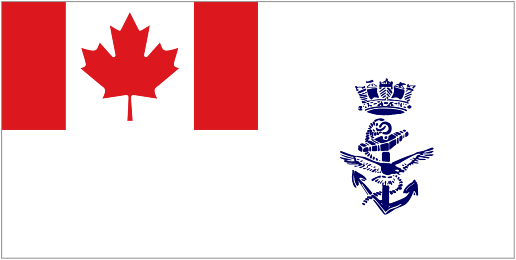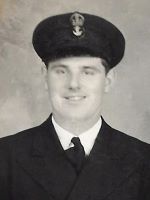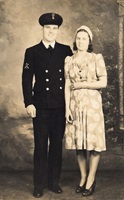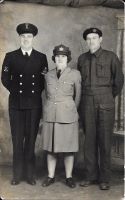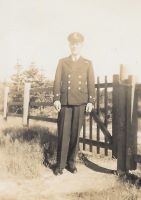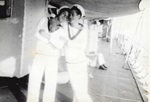|
A Royal Canadian Navy Historical Project
In memory of those who have Crossed the Bar
Remembering my brother by Marie Paulowich
At
the age of 17, Ira
joined the RCN in 1936 in Halifax, Nova Scotia. I believe the first
RCN ship he served in was HMCS Saguenay, and he was probably on the
ship when it went on a Spring Cruise in 1939. HMCS Saguenay and
HMCS Skeena were escort vessels when King George VI and Queen
Elizabeth finished their 1939 tour of Canada and departed from Halifax
Harbour. Crew members on each of our two Canadian destroyers received
a "postcard" from the Royal couple. On the front was a
picture of King George V1 and Queen Elizabeth. On the back was a
message of thanks signed by both of them. Ira
spent some time teaching Gunnery in various places including Scotland,
Saint John, New Brunswick, and Halifax. He was a member of the crew
manning one of the guns when the Athabaskan was sunk on April 29, 1944
in the English Channel. It was in June 1944 before I learned
that he wa alive, not MIA. I asked him once if he would mind telling me
something about his experience when the Athabaskan went down. I told
him I would understand if he didn't want to talk about it. I noticed
the change in his expression right away. I had seen it before on
the faces of other veterans I knew who spoke a little about their
experiences in combat. In his eyes also was the same look I had
seen before. It was as if they all looked far away and saw a horizon
that we could not see, and probably could never see. Then they would
often joke about some of the things they had experienced. All
Ira said was that he looked toward England and then to France and
decided France was closer, and he began swimming toward the coast of
France. He said nothing about being rescued by the Germans. He
had little to say about being a POW. He did say the Canadians weren't
treated badly but the Polish POWs were. He told me the Canadian POWs
got parcels from the Red Cross. He joked about how they would pool the
raisins that were in the parcels and let them ferment. I expect
a bit of the resulting drink helped to ease the mind somewhat.
That is all he had to say to me about being a survivor of those awful
times. When drinking, a while after he got home, he would sometimes
say "There is no God". Thank
God he was not one of the POWs who were marched farther into Germany
when the Allied forces were getting close to the POW camp. Luck
was with him when the Athabaskan prisoners were to begin the
"Long March" to Germany. He
and some others managed to steal a Jeep and headed towards where they
hoped they would meet some of the Allied forces. When they met a large
number of American troops, trucks and tanks, etc. coming toward them
they pulled off the road but their Jeep rolled into the ditch.
Ira hurt his thumb but it was nearly healed when he arrived home. It
was the only physical wound he suffered during the entire years of
WWII. I think it was more than just being lucky that he escaped
more physical injuries.
He came home in May, 1945. Words can never describe how it felt to have him home again. During the time that Ira was listed as an MIA, his wife, Iris, was comforted by a recurring dream in which Ira would appear and tell her he was all right and she should not worry. She never doubted that he was alive and would return to her. Ira did come home and they had many years together.
He died following a heart attack in 1984.
Ships served in: HMCS ATHABASKAN - Survived the sinking of ATHABASKAN. Captured by the Germans - became a POW.
(IJ01) Portrait of PO Johnson (IJ02) PO Ira Johnson and his wife Iris - circa 1942 (IJ03) PO Ira Johnson and his mother and father circa 1942 (IJ04) CPO Ira Johnson in 1945 on his return home in 1945, having spent a year as a German POW following the sinking of HMCS ATHABASKAN G07
IJ05 (IJ05) Ira Johnson and shipmate on HMCS SAGUENAY circa 1939
|
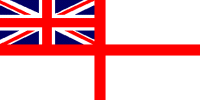 For Posterity's Sake
For Posterity's Sake 